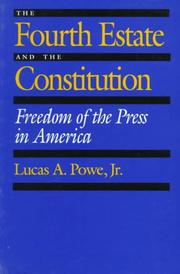| Listing 1 - 3 of 3 |
Sort by
|

ISBN: 0520913167 0585299633 9780520913165 0520080386 9780520080386 0520072901 9780520072909 9780585299631 Year: 1991 Publisher: Berkeley : University of California Press,
Abstract | Keywords | Export | Availability | Bookmark
 Loading...
Loading...Choose an application
- Reference Manager
- EndNote
- RefWorks (Direct export to RefWorks)
In 1964 the Supreme Court handed down a landmark decision in New York Times v. Sullivan guaranteeing constitutional protection for caustic criticism of public officials, thus forging the modern law of freedom of the press. Since then, the Court has decided case after case affecting the rights and restrictions of the press, yet little has ben written about these developments as they pertain to the Fourth Estate. Lucas Powe's essential book now fills this gap. Lucas A. Powe, Jr., a legal scholar specializing in media and the law, goes back to the framing of the First Amendment and chronicles the two main traditions of interpreting freedom of the press to illuminate the issues that today ignite controversy: • How can a balance be achieved among reputation, uninhibited discussion, and media power? • Under what circumstance can the government seek to protect national security by enjoining the press rather than attempting the difficult task of convincing a jury that publication was a criminal offense? • What rights can the press properly claim to protect confidential sources or to demand access to information otherwise barred to the public? • And, as the media grow larger and larger, can the government attempt to limit their power by limiting their size? Writing for the concerned layperson and student of both journalism and jurisprudence, Powe synthesizes law, history, and theory to explain and justify full protection of the editorial choices of the press. The Fourth Estate and the Constitution not only captures the sweep of history of Supreme Court decisions on the press, but also provides a timely restatement of the traditional view of freedom of the press at a time when liberty is increasingly called into question.
Book
ISBN: 0520970012 9780520970014 9780520297807 Year: 2018 Publisher: Oakland, California
Abstract | Keywords | Export | Availability | Bookmark
 Loading...
Loading...Choose an application
- Reference Manager
- EndNote
- RefWorks (Direct export to RefWorks)
Texas has created more constitutional law than any other state. In any classroom nationwide, any basic constitutional law course can be taught using nothing but Texas cases. That, however, understates the history and politics behind the cases. Beyond representing all doctrinal areas of constitutional law, Texas cases deal with the major issues of the nation. Leading legal scholar and Supreme Court historian Lucas A. Powe, Jr., charts the rich and pervasive development of Texas-inspired constitutional law. From voting rights to railroad regulations, school finance to capital punishment, poverty to civil liberties, this wide-ranging and eminently readable book provides a window into the relationship between constitutional litigation and ordinary politics at the Supreme Court, illuminating how all of the fiercest national divides over what the Constitution means took shape in Texas.
Law --- Acts, Legislative --- Enactments, Legislative --- Laws (Statutes) --- Legislative acts --- Legislative enactments --- Jurisprudence --- Legislation --- Political aspects --- Cases. --- History. --- capital punishment. --- civil liberties. --- constitution. --- constitutional law. --- constitutional litigation. --- doctrinal areas. --- history. --- legal scholar. --- major issues. --- national divides. --- ordinary politics. --- politics. --- poverty. --- railroad regulations. --- school finance. --- schooling. --- supreme court historian. --- supreme court. --- texas inspired law. --- texas law. --- texas. --- voting rights.
Digital

ISBN: 9780814722862 9780814751312 Year: 2020 Publisher: New York, N.Y. New York University Press
Abstract | Keywords | Export | Availability | Bookmark
 Loading...
Loading...Choose an application
- Reference Manager
- EndNote
- RefWorks (Direct export to RefWorks)
| Listing 1 - 3 of 3 |
Sort by
|

 Search
Search Feedback
Feedback About UniCat
About UniCat  Help
Help News
News